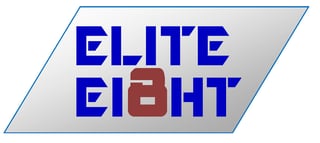 March Madness refers to the excitement, fervor and general craziness surrounding the NCAA Division I men’s basketball tournament, during which upsets, buzzer beaters and rowdy celebrations are the norm. That all ended Monday night with Duke edging Wisconsin to claim its fifth national championship. Or did it?
March Madness refers to the excitement, fervor and general craziness surrounding the NCAA Division I men’s basketball tournament, during which upsets, buzzer beaters and rowdy celebrations are the norm. That all ended Monday night with Duke edging Wisconsin to claim its fifth national championship. Or did it?
For those who simply can’t wait another year, we offer our own version of the playoffs, with a grammatical twist: April Aggravations. Below you’ll find our Elite Eight list of contenders competing for the coveted title of “Most Annoying Grammatical Error Ever,” collected from our editors here at ProofreadNOW.com.
Let us know in the comments below which ones you’d send to the Final Four, which two will end up competing for the championship and, finally, which error will win it all as “most annoying.” We’ll crown the winning pet peeve in next week’s post. Also let us know about others that grate on your nerves, and we’ll add them to the pool of contenders for our next grammatical error playoff.
In alphabetical order, our Elite Eight contenders are:
12 a.m./p.m. and noon/midnight
For being a dead language, Latin still manages to shake things up once in a while. The designation a.m. is an abbreviation of the Latin ante meridiem, meaning “before midday.” Similarly, p.m., or post meridiem, means “after midday.” How can you pair 12 (the numeral indicating midday or midnight) with a designation that means before or after midday, as in 12 a.m. or 12 p.m.? It’s illogical. And saying “12 noon” or “12 midnight” is just plain redundant. Why not just say noon or midnight (even if some dictionaries and style guides suggest otherwise)?
Home in/hone in
Home is a verb meaning to return home (like a homing pigeon) or to direct attention toward an objective (ProofreadNOW.com editors home in on grammatical errors). Hone means to sharpen or make more acute or intense (Our editors have honed their ability to home in on errors).
Although Merriam-Webster includes hone in as an entry, with a definition similar to that for home in, and acknowledges its established use in both American and British English, it notes that use of the phrase in writing likely will be viewed as a mistake. So don’t do it.
Homonym (and similar words) confusion
Certain word pairs regularly trip people up, because they sound exactly alike (homonyms) or close enough to cause confusion. Some we see regularly appear italicized in the examples below:
Henry unknowingly led his horse to the lead-contaminated river.
When questioned by parents, the principal said he had based his decision on the principle of fairness.
The representative assured Mike that his stolen equipment was fully insured and that she would ensure the claim was submitted right away.
Tom thought his decision not to study for the history test wouldn’t affect his grade much, but the effect turned out to be worse than he could have anticipated.
The zoo comprises 18 monkey species, which compose 80 percent of all primates in the Monkey House there.
Misplaced modifiers
These are words that are separated from the words they modify or describe. One of our favorites:
After being towed at a depth of 1,000 meters for three hours, John felt enough data had been gathered.
Poor John. It’s a wonder he survived. Clarifying what’s being towed fixes the problem:
After being towed at a depth of 1,000 meters for three hours, the monitor had gathered what John thought was enough data.
And another:
Send for our brochure on how to grow longer, healthier hair by email.
But how would you wash it? Moving “email” to where it belongs in the sentence corrects the problem:
Email us to receive our brochure on how to grow longer, healthier hair.
One word or two
We see numerous issues with whether to use one word or two in pairs such as everyday/every day, anytime/any time, anymore/any more and login/log in. Below are some examples of their correct usage:
Contrary to popular belief, we don’t use our everyday linens every day.
Anytime you need help, call me at any time of the day or night.
Carla said she doesn’t have any more money, but I just sent her $100. I don’t know what to believe anymore.
To log in, go to the login page and enter your username and password.
Plurals vs. possessives
Incorrectly using an apostrophe to indicate pluralization makes us all a little crazy. Apostrophe’s … NO! Apostrophes serve two functions. One is to indicate missing letters in a contraction (see below), and the other is to indicate possession. They absolutely are not used to make nouns plural. So, a Toyota dealership sells Camrys and Corollas, not Camry’s and Corolla’s, as one television commercial actually advertised.
Reflexive pronouns
Reflexive pronouns are used to show that the action in a sentence happens to the person or thing that does the action. For example:
I treated myself to a much-deserved vacation in Hawaii.
Unfortunately, they’re often misused by those who aren’t sure whether to use “me” or “I” as the object in a sentence. For example:
The state trooper went out of her way to help Max and myself when our car died on Highway 1.
The correct usage in this sentence is “Max and me” because the state trooper is the one carrying out the action, and she’s not the object of the action.
Your/You’re
The apostrophe means it’s a contraction (i.e., a shortened form of two words — in this case, you and are). Your is possessive, indicating ownership. “Your welcome” doesn’t work except in this context: You’re sure to wear out your welcome by repeatedly mixing up these words. (It’s/Its and There/Their/They’re mix-ups fall into this category too.)
That’s it! Cast your votes in the comments and/or submit your own entries for our next matchup. Thanks for playing!



